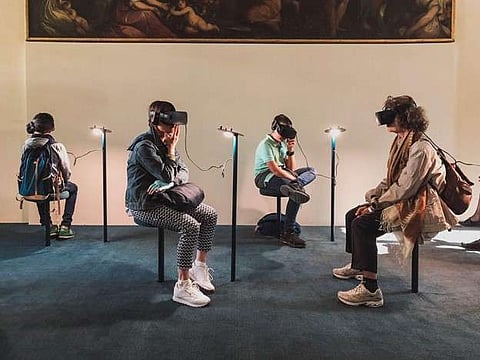
- Insights
- Cryptocurrencies
- Stocks
- White Papers
- Industry
- Geography
- Insights
- Cryptocurrencies
- Stocks
- White Papers
- Industry
- Geography


The world of technology is constantly evolving, and with it comes the emergence of new and exciting concepts that can transform the way we live, work, and play. One such concept that has been garnering attention in recent years is the metaverse.
At its core, the metaverse is a virtual world that allows users to interact with each other and digital content in a way that blurs the lines between the physical and digital worlds. It has the potential to revolutionize the way we experience entertainment, education, and even work. In this post, we'll delve deeper into the essence of the metaverse and explore its practical applications that can help businesses stay ahead of the game.
Image credit: Unsplash
In 2023, the concept of the metaverse is still treated as something impractical and rather promising for the future, while in reality, the number of the metaverse's monthly active users has reached 400 million. How do they use virtual spaces and what are the benefits of the metaverse for businesses? Let's explore key applications of the metaverse and ways in which they prove that the future is already here.
One of the most practical applications of the metaverse is for virtual events and conferences. With the pandemic forcing many events to go online, the metaverse offers a unique way to bring people together in a virtual space. Imagine attending a conference in a virtual world where you can network with other attendees, interact with virtual booths, and attend keynote speeches without leaving your home.
The metaverse offers a level of immersion that traditional video conferencing cannot match, and it can be a game-changer for businesses that rely on events to connect with customers and partners.
The metaverse can also be used to create virtual showrooms and product demos. For example, a car company can create a virtual showroom where customers can explore their latest models in a realistic 3D environment. This allows customers to get a feel for the car before they even step into a physical dealership. Similarly, companies can use the metaverse to create virtual product demos that showcase the features and benefits of their products in an interactive way. This can be especially useful for complex products that are difficult to demonstrate in a traditional video format.
Another practical application of the metaverse is for virtual training and education. With the rise of remote work, many businesses are looking for ways to train their employees remotely. The metaverse offers a unique way to deliver training that is engaging, interactive, and immersive. For example, a company can create a virtual training environment where employees can practice real-life scenarios in a safe and controlled environment. This can be especially useful for industries such as healthcare and aviation, where safety is a top priority.
The metaverse can also be used for virtual real estate and property management. With the rise of remote work, many people are looking for new ways to live and work. The metaverse offers a unique way to create virtual properties that can be rented or sold to people around the world. For example, a company can create a virtual co-working space where people can work and collaborate with others in a virtual environment. Similarly, property managers can use the metaverse to showcase their properties in a realistic 3D environment, making it easier for potential tenants to get a feel for the space before they even step inside.
The metaverse makes a part of virtual advertising and marketing. With the rise of ad blockers and the increasing difficulty of reaching audiences through traditional channels, virtual advertising can be a new way to capture consumers' attention.
Companies can create immersive and interactive advertisements in the metaverse that allow users to engage with their brand in a unique way. For example, a clothing brand can create a virtual store where users can try on clothes and purchase items in a realistic 3D environment. Similarly, companies can use the metaverse to create virtual events and experiences that allow users to engage with their brand in a more memorable way. By leveraging the metaverse for advertising and marketing, businesses can reach new audiences and create a more immersive brand experience.
Finally, the metaverse can be used for virtual healthcare and wellness. With the rise of telemedicine, the metaverse offers a unique way to deliver healthcare services in a virtual environment. For example, a doctor can use the metaverse to conduct virtual consultations with patients, making it easier for patients to access healthcare services from the comfort of their own homes. Similarly, companies can create virtual wellness programs that help employees stay healthy and active. This can be especially useful for remote workers who may not have access to traditional gym facilities.
As you see, the metaverse has the potential to transform the way we interact with digital content. To sum up, technology not just had the potential to change real-world experiences but is already doing that in a number of domains and business areas:
The metaverse offers a wide range of practical applications that can help businesses stay ahead of the curve. By embracing this technology, tech companies can unlock new opportunities for growth and innovation, and stay ahead of the competition.
